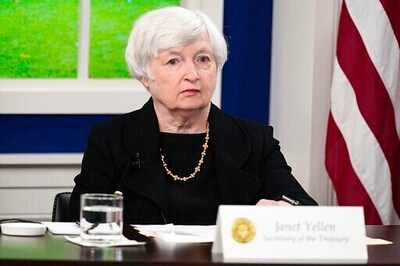
views
One out of every five persons is likely to become depressed at some point in his life. World Health Organisation (WHO) estimates the life time prevalence of depression to be 10%. WHO assesses the seriousness of any problem using the yardstick of ‘Burden of Disease’ (which is an estimation of the burden caused by the illness due to disability as well as premature mortality). Currently depression ranks as the number two cause (next only to cardiac disease). By 2030 it is estimated, depression will become the number one cause for Burden of Disease. There is no doubt, in our fast changing world, the incidence of depression is increasing day by day. The effects of commercialisation, commoditisation of illness and urbanisation are slowly taking a heavier and heavier toll on our mental health.
Since 1992, October 10 every year is being observed as the World Mental Health Day. This year the global observance is under the leadership of the World Federation for Mental Health (WFMH) .
In our country, Indian Psychiatric Society (IPS) is taking the leadership role. The Day as well as the Mental Health Week (Oct 10-16) observance will be held with varied programmes under the leadership of the five Zonal and 24 State branches of Indian Psychiatric Society. The theme this year is ‘Depression- A Global Crisis’.
What is depression?
Depression should be recognised from normal sadness, which is the most common human experience. It is quite natural for people to become sad or upset after financial loss, loss of employment, humiliation, death of loved persons etc. Usually, people are able to get over these sad experiences after some time. But depression is different. In Depression a person experiences depressed mood, loss of interest or pleasure, inability to enjoy and lack of energy.
He may have poor sleep, poor appetite, poor concentration and poor memory. Indecisiveness, guilt feelings, ideas of hopelessness, helplessness and worthlessness may be other features. As the symptoms worsen, the person may experience a wish to die and may have suicidal ideation.
It may lead to suicide attempts and even death. In fact the vast majority of those who commit suicide suffer from depression. This should be particularly noticed in a State like Kerala, where the suicide rates are particularly high (25/100,000). It is a paradox, since Kerala is otherwise a model in public health with the best indices for lower infant mortality rate and maternal mortality rate and high life expectancy. It leads us to the inescapable conclusion that mental health is grossly neglected in Kerala, as in most parts of India.
It is curable
The truth about depression is, it is a completely curable disease. Many mild forms of depression may not require any medication. Psychological support and psychotherapy will be quite beneficial. But when illness is of moderate or severe nature, medications are necessary. New anti-depressant drugs, which are devoid of any disabling side-effects, have now become available. One need not be afraid of taking anti-depressants when prescribed by a qualified doctor, as they are neither sedatives nor addiction producing.
In severe forms of depression, especially with suicidal ideation, Electro- Convulsive Therapy (ECT) may become necessary. Although ECT is much maligned, often due to ignorance, it is a life saving treatment in needy cases. Major depression results when there is neuro biochemical abnormality in the brain- especially manifested as lower levels of vital neuro-transmitters like serotonin, epinephrine, dopamine etc. Some people, especially when there is tendency for depression to recur, may have to take anti-depressants for a longer time.
WHO currently advocates the ‘Recovery’ model in the management of depression. This includes personal empowerment of the patients, learning coping strategies and building support networks. Herein lies the role of the family and the community who must all participate in the care and management of the depressed person.
Public health education, role of media and NGOs are also very important. The message that depression is a disease that has to be diagnosed early and that it is treatable and curable should reach everyone.
What is the road ahead
In India, we have only 4,000 psychiatrists for a population of 1.2 billion. This gives a psychiatrist- population ratio of 1: 300, 000. We will need at least 20 times more of psychiatrists and mental health professionals in our country.
This will take decades and probably centuries. Hence the only option before us is to train our young medical graduated doing MBBS, in Psychiatry. Currently this training is wholly inadequate- with few lectures and no examination.
Indian Psychiatric Society has represented to the Govt of India and Medical Council of India, Psychiatry should be taught as as subject with adequate training and examination during graduate medical education. We have said, since 14% of Global Burden of Disease is caused by psychiatric disorders, at least 6% of the time during MBBS should be devoted to learning Psychiatry.
WHO has repeatedly emphasized, mental health services can be adequately delivered through Primary Care, provided the medical graduate has adequate training in Psychiatry.
The new Mental Health Care Bill (replacing Mental Health Act 1987) is likely to come up before parliament very soon. This is a very progressive legislation and mandates the Union and state governments to provide mental health services, including provision of psychotropic drugs. Indian Psychiatric Society has demanded, Psychiatry Units in all the General Hospitals (private and government) should be kept outside the purview of the Act, to make mental health services, accessible to all.
Depression is a global crisis, and let us all collaborate and work together to face the challenge and bring forth positive mental health for all. For this, the Governments should accord foremost priority to mental health. Let us hope, this will be done!
(The author is President, Indian Psychiatric Society and can be reached at [email protected])




















Comments
0 comment